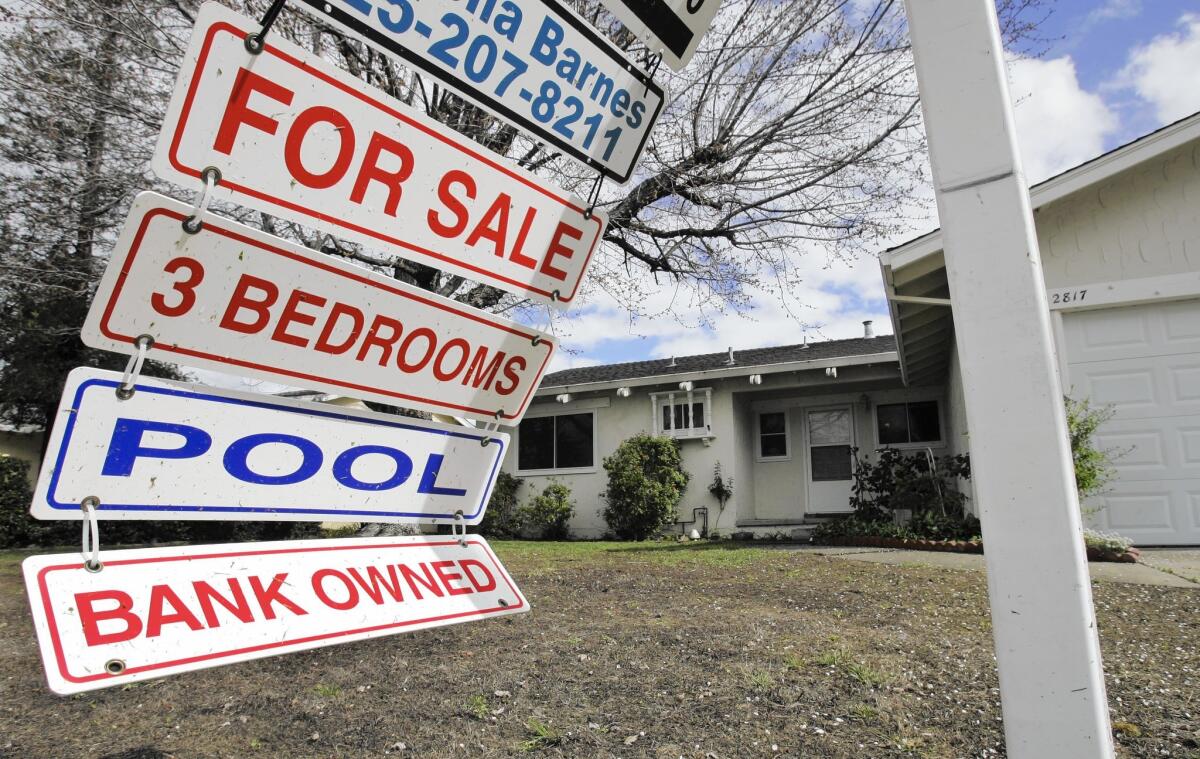California must repay national mortgage settlement cash used to balance state budget

- Share via
SACRAMENTO — Gov. Gavin Newsom’s administration said Friday it would begin work on transferring $331 million back into a special fund designed to help California homeowners hit hard by the recession-era mortgage crisis, money that the courts have ruled was wrongly used to help balance the state budget.
The California Supreme Court refused earlier this week to hear an appeal by the administration disputing lower court rulings that found the state mistakenly used a portion of the money — paid by large banks and lenders as part of a nationwide legal agreement in 2012 — to pay off housing bonds. In some cases, those bonds were enacted a decade before the mortgage settlement. In all, three years of state budget expenses were covered by a portion of what California received from the mortgage settlement.
The decision to use the money was championed by Newsom’s predecessor, former Gov. Jerry Brown. Legislators subsequently ratified the plan, and last year went even further: They passed legislation seeking to block a court ruling to repay more than $331 million into a fund originally designed for statewide homeowner assistance efforts. Groups that waged a five-year court battle over the funds expressed relief that the legal fight was finally over.
“Truth prevails,” said Faith Bautista, president and chief executive of the National Asian American Coalition. “They’re now facing the reality that the money belonged to the homeowners in distress.”
While the money in question was undoubtedly tempting at the time it was diverted — California’s budget was still reeling from successive years of back-to-back deficits — the state’s coffers are now overflowing. The budget signed by Newsom last month includes $19.2 billion in cash reserves, making the repayment of the mortgage settlement money limited only by how fast state leaders can take action. The Legislature will return next month for the final weeks of its 2019 session.
The money diverted to state budget needs was a small portion of what both California homeowners and the government received from the national settlement agreed to by 49 states in 2012. Those states, along with the federal government and the District of Columbia, had earlier filed suit against the nation’s five largest mortgage servicers: Ally (formerly known as GMAC), Bank of America, Citigroup, J.P. Morgan Chase and Wells Fargo. The legal action alleged a number of federal law violations, and the financial institutions agreed to pay more than $20 billion to homeowners affected by the mortgage crisis. The companies also agreed to pay the states a total of $2.5 billion.
California’s share of the state payments was $410 million, to be used for a variety of services directed by then-Atty. Gen. Kamala Harris. But most of the money was used instead for budget-balancing items which, while related to housing, were long-term costs that further shrank the funds available for basic government services. A coalition including representatives for Asian American and Latino communities sued the state in 2014 over its decision to use the money to help erase a projected budget deficit. A Sacramento judge ruled for the coalition in 2015 and the 3rd District Court of Appeal agreed with that ruling last year.
State leaders, however, refused to back down. At the end of the 2018 legislative session, lawmakers and Brown crafted a bill that said the money was used correctly, and the enacted law sought to give the Legislature the power to “abrogate,” or revoke, the appeals court order to replenish the spent money.
In April, the same appeals court again rebuked state officials.
“It is the judicial branch that has the constitutional authority to interpret statutes,” the three-judge panel wrote in its ruling, stating that the mortgage settlement “money was unlawfully diverted from a special fund in contravention of the purposes for which that special fund was established.”
On Wednesday, the California Supreme Court refused Newsom’s request to hear the case, allowing the appeals ruling to stand.
“Now that the Supreme Court has issued its decision in this matter, we will move forward to implement the ruling,” said H.D. Palmer, a spokesman for the California Department of Finance.
Bautista, whose Daly City-based group works with low-income communities of color across the state, said she hopes the $331 million will be supplemented by money from the nation’s leading lenders to offer services such as down payment assistance for those who went through foreclosure during the housing crisis and want to again own a home. She said other services, including financial literacy efforts and those helping Californians with low credit scores, should also be considered. And she urged Newsom to make such efforts part of his larger discussion about the state’s housing crisis.
“People are hurting in East L.A., Riverside, the Central Valley,” Bautista said. “Let’s pick what’s best and use the money wisely.”
Neil Barofsky, an attorney who represented the groups that fought the cash diversion in the courts, said it was disappointing that state officials spent so many years on “frivolous appeals,” culminating in what he called the “ginned-up legislative action” last year designed to block repayment of the money and the appeals court ruling.
“We understand it was a desperate time for the state when this happened,” he said. “But once we returned to surpluses, the idea that they would just keep fighting this has been breathtaking.”
More to Read
Sign up for Essential California
The most important California stories and recommendations in your inbox every morning.
You may occasionally receive promotional content from the Los Angeles Times.











